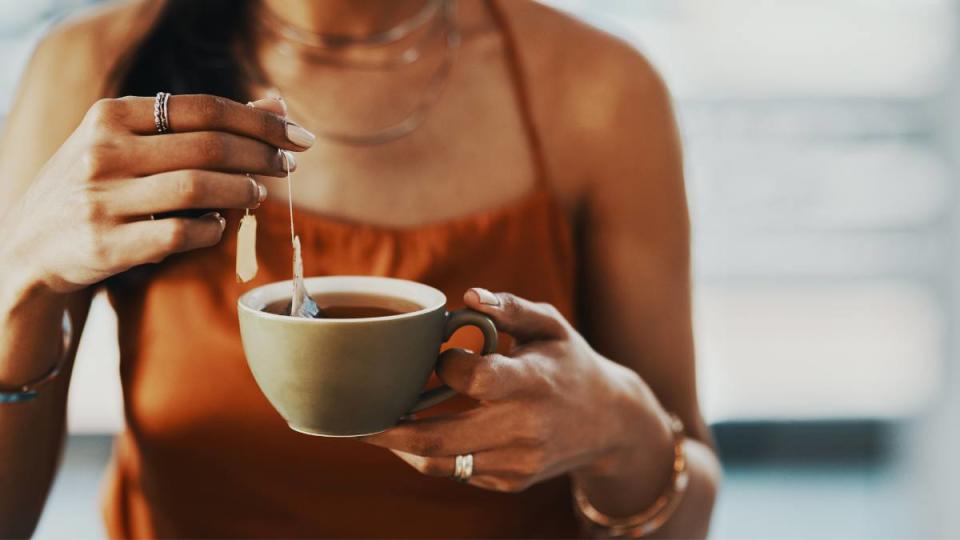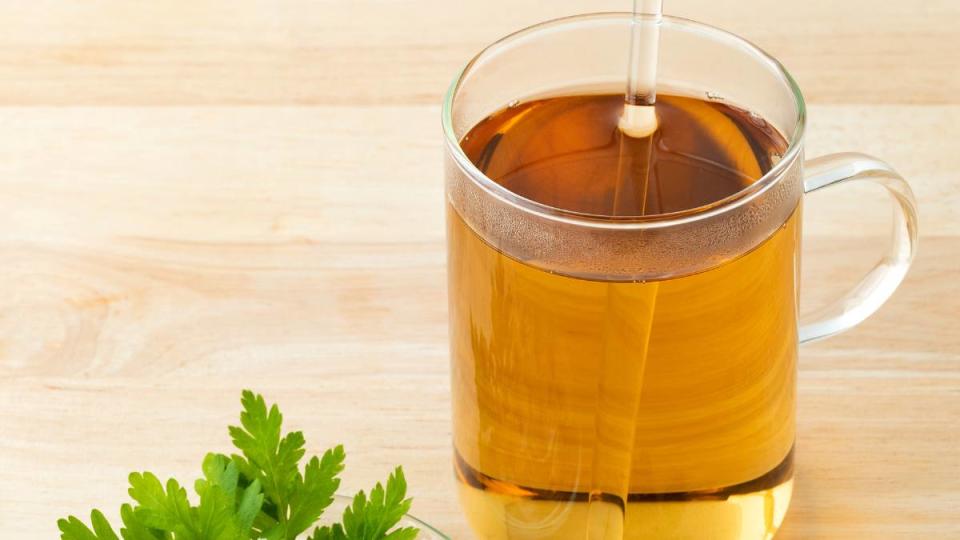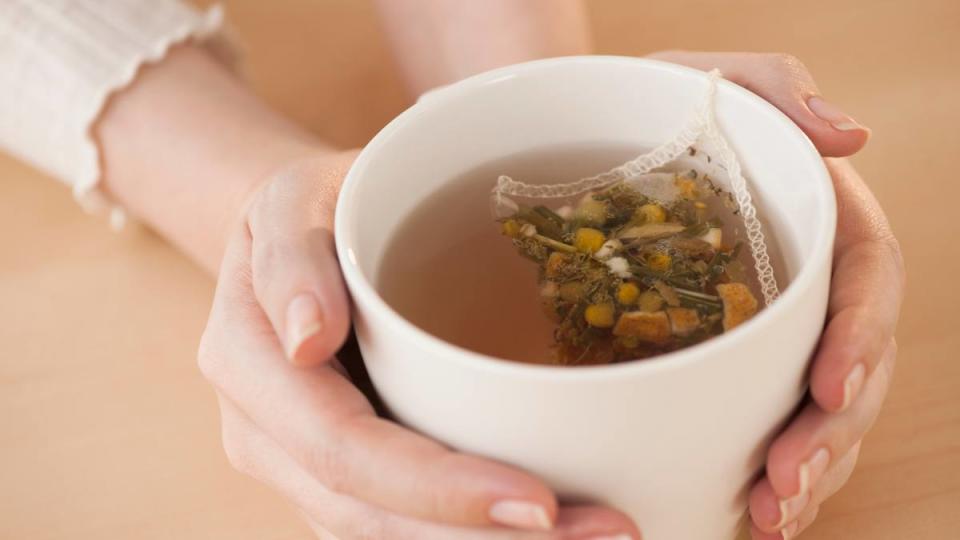Experts Reveal the Best Tea for Headaches That Soothe Pain Naturally
A warm, relaxing cup of tea always sounds nice when your head hurts. And if you pick the right type, it just might make that stubborn pain go away. As one of the most age-old symptom soothers, there's good reason to drink tea for headaches.
"I frequently recommend herbal teas for people who suffer from headaches," says Michelle Shoffro Cook, PhD, author of Pain Erasers: The Complete Natural Medicine Guide to Safe, Drug-Free Relief. "They are simple to incorporate, an enjoyable way to reap the health benefits of herbs and an opportunity for people to incorporate more self-care into their day."
Here's a look at the best expert-recommended herbal tea varieties for headaches.
Headaches 101
Splitting, throbbing head pain most often comes in the form of a tension headache or a migraine headache. Tension headaches, which are caused by tense muscles or stress, often feel like a dull band around your head. "They're annoying but not severe enough to interfere with everyday activities," explains Lauren Natbony, MD, founder and medical director of Integrative Headache Medicine of New York.
Migraines are more intense. "They're a chronic disease state that cause the body to be more sensitive to outside stimulation and trigger pain in response," Dr. Natbony says. Migraines usually cause a pounding, throbbing pain on one or both sides of the head and can be accompanied by nausea, vomiting or increased sensitivity to light, sound, or odors. Unlike tension headaches, "they interfere with someone's ability to function," says Dr. Natbony.

Related: Migraine vs Tension Headache: How to Tell the Difference + the Best Way to Speed Relief
Common headache triggers
Despite their differences, tension headaches and migraines often share similar triggers, Dr. Natbony says. While everyone's triggers are different, some of the most notorious offenders include:
Alcohol, especially red wine
Certain foods, including processed meats, chocolate and aged cheeses
Nicotine use
Sleep deprivation or changes to your sleep routine
Poor posture (which can cause muscle tension)
Skipping meals (which can cause low blood sugar)
Why headaches worsen with age
Research shows that women are more prone to both tension headaches and migraines, likely thanks to fluctuations in estrogen levels. That can cause younger women to get hit with migraines around the time of their periods. And as we get older, estrogen shifts from menopause can also factor in.
"After menopause, you can get an increase or a decrease in migraines," Dr. Natbony says. "People can have an onset of new migraines after menopause as well."
How tea can help with headaches
Most people need a multi-pronged approach to get a handle on their headaches. "It takes a comprehensive approach to find what works," Dr. Natbony says. That can include things like ID'ing your triggers, managing stress, getting enough sleep and in some cases, taking meds (especially if regular migraines interfere with your daily activities).
Sipping a soothing tea can be part of the mix, too. "As a non-medical, complementary approach, it can be a good one," says Dr. Natbony. Not only can certain herbs help with managing pain, but sometimes, taking a few minutes to relax with a cozy cuppa might be just what your throbbing head needs. "The act of drinking a warm beverage can be calming and soothing," adds Dr. Natbony. "Putting warm substances in the mouth can also activate different nerves and receptors that can be pain-relieving."
There's also the fact that herbal tea is a top-notch hydrator. And since falling short on fluids can trigger head pain, simply getting more liquids is often enough to stave off a headache or even stop one in its tracks. For people suffering from dehydration-related migraines, drinking just 16 oz. of water was enough to deliver relief in 30 minutes, found a study in the journal Headache. (Click through to learn how a motivational water bottle helps encourage you to drink up, too.)

The 5 best tea varieties for headaches
So, which sippers are the best for easing a splitting head? While science has shown a number of herbal extracts to be helpful for managing headaches and their related symptoms, there hasn't been much research on taking the herbs in tea form. So "we can't say what dose will be helpful," Dr. Natbony says.
That said, here are some of the best options to try, according to Dr. Natbony and Dr. Cook.
1. Ginger tea
Sip some ginger tea the next time tightness in your neck or shoulders triggers a tension headache. The spicy root's potent anti-inflammatory properties "improve circulation in the blood vessels to the head and help alleviate soreness and tightness in the muscles," Dr. Cook says. "This makes it a good option for headaches and to reduce muscle soreness linked to stress that can be a factor for headaches. I usually recommend people drink it at the first sign of a headache."
Ginger's a good option for easing migraine-related queasiness too, Dr. Natbony says. In fact, it may reduce nausea and vomiting by 48%, according to a review in the Journal of Clinical Psychiatry. One to try: Traditional Medicinals Organic Ginger Tea (Buy from Amazon, $4.92). (Click through for more of the best migraine self-care remedies.)
2. Feverfew tea
"I recommend feverfew in supplement form for migraine prevention," Dr. Natbony says, so it makes sense that a feverfew cuppa is a good option when head pain strikes. Taking feverfew extract daily has been shown to reduce the frequency of migraines up to 50%, found a review in Phytotherapy Research. Experts suspect it's because the herb contains compounds that support healthy blood flow to the brain and boost the production of the feel-good hormone serotonin. (Click through for more serotonin-boosting foods.)
While feverfew's migraine-fighting effects haven't yet been studied in tea form, it stands to reason sipping the herbal brew could also help keep headaches at bay. You'll reap the biggest benefits when you drink it regularly, not just when you feel a headache coming on. "Feverfew tea is best drunk on a daily basis for at least a month or two, as it works to reduce the frequency and severity of headaches over time," Dr. Cook says. One to try: Palm Beach Herbals Feverfew Tea (Buy from Amazon, $14.95).

3. Willow bark tea
Derived from the bark of the willow tree, willow bark is rich in salicin, an anti-inflammatory- compound similar to aspirin that's been proven effective for fighting lower back pain. "It's one of Mother Nature's analgesic remedies," Dr. Cook says.
As for your head? Considering its natural pain-relieving effects, it's a smart pick. "It is a good option to reduce headache pain," says Dr. Cook. Just check with your doctor first if you're at an increased risk for bleeding or bruising, since willow bark may increase the risk for bleeding. One to try: Halo Naturals Organic White Willow Bark Tea (Buy from Amazon, $9.99).
4. Chamomile tea
Stress and sleep struggles can both be recipes for a headache. If that's the case for you, sipping a cup of chamomile when you start to tense up is a relaxing Rx. "It can be calming and soothing," says Dr. Natbony. "So if stress and anxiety are headache triggers for you, it can be a good option." One to try: Celestial Seasonings Chamomile Herbal Tea (Buy from Amazon, $18.72). (Click through to see why chamomile is one of the best teas for a sore throat, too.)

5. Licorice tea
Tend to get headache-y when you haven't had time to eat or grab a snack? Low blood sugar can set off a headache, but sipping licorice tea can help. "It helps to regulate blood sugar," Dr. Cook explains. "It is also an adaptogenic herb, which means it helps the body cope with stress by helping it raise or lower natural compounds as necessary. And stress is often underlying many headaches." One to try: Traditional Medicinals Organic Licorice Root Tea (Buy from Amazon, $9.57).
How to brew tea for headaches
You'll get the most headache-fighting goodness from your teas with a long steep time, allowing more of the herbal compounds to be extracted into the hot water. "Use 1 tsp. of dried herb or one tea bag per cup of boiled water. Let it steep for 10 to 15 minutes," says Dr. Cook, who's a fan of herbal teas from the brand Traditional Medicinals.
It's also a good idea to skip sugar or artificial sweeteners, since they can trigger headaches, she adds. If you want a sweeter flavor, try a few drops of Stevia instead.
Why you should skip tea blends for headaches
Rather than mixing several herbs together, consider sipping just one type of herbal tea at a time, Dr. Natbony recommends. While it might be tempting to pair ingredients for a more potent sipper, experimenting with single herbs will make it easier to tell if something works for you or not, she explains.
For more healing teas:
The Best Tea for a Sore Throat? Docs Reveal Their Top 6 Picks That Soothe Fast
Don’t Toss That Avocado Seed! Use It To Brew Up a Delicious, Heart-Healthy + Slimming Tea
This content is not a substitute for professional medical advice or diagnosis. Always consult your physician before pursuing any treatment plan.
First For Women aims to feature only the best products and services. We update when possible, but deals expire and prices can change. If you buy something via one of our links, we may earn a commission. Questions? Reach us at [email protected]
